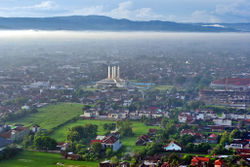Difference between revisions of "Chitra"
(SESCO regional headquarters~) |
|||
| Line 102: | Line 102: | ||
'''Melunebet''' ([[Lithian]]: Melunebet /melunebet/<!--add IPA in the native language, and any other minority languages in the city-->) is a city located inland in [[Lugilik-Fira|the State of Lugilik]], in [[Lugida]], with a population of about 2 million. | '''Melunebet''' ([[Lithian]]: Melunebet /melunebet/<!--add IPA in the native language, and any other minority languages in the city-->) is a city located inland in [[Lugilik-Fira|the State of Lugilik]], in [[Lugida]], with a population of about 2 million. | ||
Melunebet is distinct from the rest of Lugida | Melunebet is distinct from the rest of Lugida as it is historically separate from Lugida until it was conquered by the former Lugid empire on the early 19th century, aside from other short-lasted conquests. Melunebet's geographical location that is inland, combined with the presence of a major river and proximity to [[Mount Nidarum]], kept much of the city's native culture intact from external influence. Much of it is preserved today in the form of art and architecture, and it is reflected by heritage sites like [[Julimthan]], which is one of Lugida's single most visited tourist site. This unique culture made the city appointed as SESCO's Southwest/West Mirarian regional headquarters. | ||
==Etymology== | ==Etymology== | ||
The [[Lithian]] name of the city comes from the two Lithian words, ''Melunt'' "outside", and ''Lebet'' "bridge", thus literally "outside bridge". The name refers the cultural differences between the Melunes and the rest of Lugida, which makes the city "the bridge to the outside culture", as reflected in its name. Here, the "outside" may refer to either the Melunes themselves or the neighboring [[Yerlan|Yerlanis]]. | |||
==History== | ==History== | ||
Revision as of 12:34, 24 March 2017
Melunebet
Melunebet-Naga | |
|---|---|
 | |
| Country | Lugida |
| State (Fira) | Lugilik-Fira |
| Status | State Capital (Fira Kitraga) |
| Area | |
| • Total | 1,702 km2 (657 sq mi) |
| Population | |
| • Total | 1,864,700 |
| • Density | 1,095/km2 (2,840/sq mi) |
| Demonym(s) | Melune Melunebetia (native) Meluntia (native, informal) |
| Time zone | SCT+0 |
Melunebet (Lithian: Melunebet /melunebet/) is a city located inland in the State of Lugilik, in Lugida, with a population of about 2 million.
Melunebet is distinct from the rest of Lugida as it is historically separate from Lugida until it was conquered by the former Lugid empire on the early 19th century, aside from other short-lasted conquests. Melunebet's geographical location that is inland, combined with the presence of a major river and proximity to Mount Nidarum, kept much of the city's native culture intact from external influence. Much of it is preserved today in the form of art and architecture, and it is reflected by heritage sites like Julimthan, which is one of Lugida's single most visited tourist site. This unique culture made the city appointed as SESCO's Southwest/West Mirarian regional headquarters.
Etymology
The Lithian name of the city comes from the two Lithian words, Melunt "outside", and Lebet "bridge", thus literally "outside bridge". The name refers the cultural differences between the Melunes and the rest of Lugida, which makes the city "the bridge to the outside culture", as reflected in its name. Here, the "outside" may refer to either the Melunes themselves or the neighboring Yerlanis.